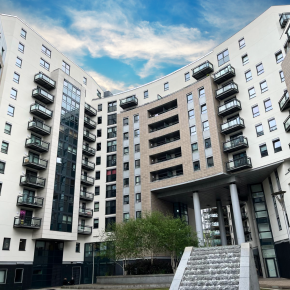
GUEST ARTICLE: Commercial Spaces are Closing at a Record-high Rate. Yet the Post-pandemic Future is Looking Bright for UK High Streets
Ramsey Assal, CEO at The Landsite, talks about how, despite commercial spaces closing at a record-high rate, the post-pandemic future is looking bright for UK high streets.
Prior to the pandemic, there were concerns regarding the future of the high street. Now that social distancing restrictions have forced many hospitality and retail businesses to close their doors at least partially, these voices of concern have understandably amplified. And after the Autumn Budget announcement this week, these concerns rise even more so with the Government failing to reform rates or tax online sales giants.
Almost one in four businesses have temporarily closed during the past year’s lockdown restrictions. Of these, as much as 43% may never open their doors again.

This paints a picture of the future high street of empty store fronts and vacant spaces. However, there are plenty of reasons to be hopeful for future retail and hospitality spaces once the pandemic ends.
16,000 Retail spaces are at risk
Retail as an industry is still thriving — just not through high street shops. The first half of 2020 saw the equivalent of five years of growth for online retailers in just a matter of weeks. And even when restrictions eased during the summer and latter half of 2020, shoppers remained at home rather than on the high streets.
But while online retailers thrive, commercial high street spaces have been hard hit by the pandemic. Unable to open high street shops, hundreds of thousands of retail jobs have been made redundant and the list of bust and failing companies keeps growing. In 2020, more than double the amount of stores were affected by company failures compared to 2019, and so far 2021 is on track to triple this, with potentially 16,000 stores being at risk.
Hospitality businesses are closing at the highest rate on record
For hospitality spaces unable to open at least partially during the past year, the outlook is bleak: 43% of those who haven’t opened their doors this past year are now permanently closed. That’s nearly 12,000 licensed premises that have closed since December 2019 — around 30 per day, the highest rate on record. And while 4,170 new hospitality venues have opened, there have been nearly 3 closures for every opening, leaving a loss of 7,724 spaces in total.
While the statistics for commercial spaces look bleak, the future is starting to look brighter
As much as retailers are transitioning online, this doesn’t mean the high street won’t reopen. The demand for high street shopping is alive and well. Polling shows two-thirds of Brits are keen to get back to local high streets.
Prior to the pandemic, many high streets were booming with as little as 7% empty store fronts. Considering the demand for in-person shopping, there’s no reason high street shops couldn’t be revived to this previous rate once the pandemic ends.
Future of hospitality businesses more promising
The future of hospitality businesses is also more promising than current trends would lead you to believe. There is keen interest in getting back to restaurants, pubs and bars once it’s safe to do so. 76% say they plan to go out to hospitality venues once COVID restrictions end. Reassuringly, 55% say they feel safer in hospitality venues than they do in shops. The overall suggestion is that a quick revival in hospitality will be supported by an enthusiastic British public.
Some city centres have only lost 3% of their licensed premises since December 2019. In London, a below average 6.3% have closed their doors. This, alongside public demand for these spaces, leaves optimism for a swift bounce back, and vacant properties are unlikely to stay vacant for long. Already, 44% of venue owners say they plan to open new premises this year.
Rishi Sunak’s recent budget
Further reassurance can be found in Rishi Sunak’s recent announcement in the 2021 budget that 700,000 shops, pubs, restaurants, hotels and other businesses will be offered grants of up to £18,000 to stay afloat and hopefully thrive once lockdown restrictions end. With the easing of restrictions on 21st June in sight, the hope of re-opening doors and getting back to business as usual is soon to be a reality.
And as the national workforce slowly but surely returns to offices, this will increase the footfall we see on high streets which will play its own part in the recovery of high street retail and hospitality businesses.
While many companies have adapted to the work from home movement, the coming years are bound to see a return to physical offices for most as virtual meetings and other work from home solutions cannot match the collaboration in-person meetings achieve. And these people returning to work will make use of the high streets on lunch breaks and after work shopping and dining.
Our commercial spaces will quickly bounce back from the impact of COVID-19
It’s been an incredibly tough time for businesses and commercial spaces. The closure of stores as big and far-reaching as Debenhams has naturally led to speculation that this is the end of the high street as we know it. But in actual fact, the future of the high street is bright. Having been stuck inside for the past year, the public are keen to get back to shops, restaurants and bars more than ever.
And with this demand comes opportunity for those who have been hit by the pandemic to bounce back and even grow, with chances for local businesses and start-ups to claim space on the high street. We’re seeing hot spots of demand, driven by shifts to home working and local shopping, reflected in increased interest for both retail and hospitality sites in city suburbs, home county commuter towns and convenience centres. It’s clear that businesses are preparing for a post-COVID Renaissance for our commercial spaces in the UK.
Latest news

4th February 2025
Delta Membranes: An Education in Waterproofing
As proud members of the RIBA CPD Providers Network, Delta Membranes can offer its CPDs as double point RIBA Accredited.
Posted in Articles, Building Industry Events, Building Industry News, Building Products & Structures, Building Regulations & Accreditations, Building Services, Continuing Professional Development (CPD's), Damp & Waterproofing, Facility Management & Building Services, Information Technology, Restoration & Refurbishment, Retrofit & Renovation, Seminars, Training
4th February 2025
Wetherby Wall Systems: Guiding the Industry Through Gateway 2 Compliance
As the construction sector adapts to the UK’s Building Safety Act 2022, Wetherby Wall Systems, part of the ROCKWOOL Group, is positioned to support industry professionals in navigating the new regulatory landscape.
Posted in Articles, Building Industry News, Building Products & Structures, Building Regulations & Accreditations, Building Services, Building Systems, Cladding, Facades, Facility Management & Building Services, Insulation, Posts, Restoration & Refurbishment, Retrofit & Renovation, Security and Fire Protection, Walls
3rd February 2025
Senior takes the lead on sustainability with new appointment
Senior Architectural Systems, the UK’s largest privately-owned manufacturer of aluminium windows, doors, and curtain walling, has appointed Luke Osborne to the newly created role of UK sustainability lead.
Posted in Aluminium Products, Architectural Ironmongery, Articles, Building Industry News, Building Products & Structures, Building Regulations & Accreditations, Building Systems, Doors, Recruitment, Restoration & Refurbishment, Retrofit & Renovation, Sustainability & Energy Efficiency, Windows
3rd February 2025
Gilberts: The Fine Detail of Special Needs Support
The ‘outstanding’ Highfurlong School is demonstrating its excellence via the attention to detail in its new extension – even the Gilberts ventilation has been chosen to support specific pupil needs.
Posted in Air Conditioning, Articles, Building Industry News, Building Products & Structures, Building Services, Case Studies, Facility Management & Building Services, Heating, Ventilation and Air Conditioning - HVAC, Posts, Restoration & Refurbishment, Retrofit & Renovation
 Sign up:
Sign up: